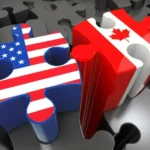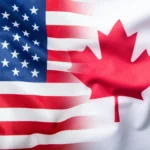
In today’s tight connected global economy, decisions made by the U.S. Federal Reserve rarely stay confined to American soil. For Canadians looking to buy, refinance, or renew their mortgages, what happens in Washington has very real consequences while we move to 2025. With economic volatility on the rise, shifting trade policies, and cautious central banks, the Canada mortgage market is facing a wave of uncertainty—largely influenced by what’s happening south of the border.
Table of Contents
- How U.S. Interest Rates Create Ripple Effects in Canada
- Why does this matter to Canadian borrowers?
- Trade Tensions Are Fueling More Than Just Headlines
- What This Means for Canadian Homebuyers and Mortgage Holders
- Is Cross-Border Property Investment Still Worth It?
- Mortgage Uncertainty with the Right Guidance
- Want real-time insights on how global trends affect your money?
How U.S. Interest Rates Create Ripple Effects in Canada
Earlier this month, the U.S. Federal Reserve held its benchmark interest rate steady at 4.25–4.50%. While the decision was widely expected, the underlying message remains one of caution. High inflation, global trade friction, and political unrest are forcing the Fed to take a wait-and-see approach, with only two potential rate cuts projected for the remainder of 2025.
Why does this matter to Canadian borrowers?
The U.S. treasury yields respond immediately to Federal Reserve updates—and Canadian bond yields often follow the same path. Since Canadian fixed-rate mortgages are closely tied to bond markets, any volatility in the U.S. can impact how much you’ll pay in interest here at home.
Trade Tensions Are Fueling More Than Just Headlines
Beyond interest rates, rising U.S.–Canada trade tensions are adding even more pressure to the lending environment. Ongoing tariff disputes and supply chain disruptions are reshaping inflation forecasts, creating uncertainty that makes borrowing riskier and more expensive for both lenders and borrowers.
- Canadian lenders, this means shrinking margins and tighter lending policies.
- For Canadian homebuyers, it creates a landscape where mortgage rates fluctuate based on global events, not just domestic policy decisions.
What This Means for Canadian Homebuyers and Mortgage Holders
If you’re buying a home in major cities like Toronto, Vancouver, or Calgary, you may already be seeing the impact. Fixed-rate mortgages have become more sensitive to international market swings. Even if the Bank of Canada starts cutting rates, lenders may be reluctant to fully pass on those savings if instability continues abroad.
For those with variable-rate mortgages, Canadian policy still plays a larger role, but global uncertainty can still influence how institutions price risk, potentially leading to less favorable terms.
One of the biggest groups affected in 2025? Those facing mortgage renewal.
With nearly 60% of Canadian mortgages up for renewal in the next 18 months, homeowners must navigate a tricky environment. Even if interest rates trend downward, renewal terms could remain unpredictable—especially if bond yields stay elevated due to U.S. market pressures.
Is Cross-Border Property Investment Still Worth It?
For years, Canadians have looked to U.S. real estate, particularly in Florida, Arizona, and Texas—for affordable vacation homes and investment opportunities. But that tide is changing.
As U.S. mortgage rates remain high and the broader economic outlook becomes more uncertain, many Canadian investors are pressing pause on cross-border property purchases. This hesitation is starting to shift investment flows, affecting both Canadian and American real estate markets.
If you’re considering buying property in the U.S., it’s crucial to factor in currency fluctuations, borrowing restrictions, and local market conditions—not just the sticker price.
Mortgage Uncertainty with the Right Guidance
In today’s climate, watching the rate announcements alone isn’t enough. The smart move is to, Work with professionals who understand both global economics and local lending trends.
Whether you’re preparing to buy, looking to refinance, or entering a mortgage renewal window, partnering with an experienced mortgage broker gives you access to insight, not just options. They can help you understand how U.S. central bank policy or global trade headlines might affect your rate, your term, or your overall borrowing strategy.
As we move through 2025, one thing is clear: Canada’s mortgage market is no longer insulated from global events. What happens in Washington can impact your monthly payment in Winnipeg.
Want real-time insights on how global trends affect your money?
Stay connected with MAKE MONEY COUNT for expert guidance, news breakdowns, and mortgage strategies tailored to today’s economic climate.
Let knowledge be your edge in uncertain times.

















No Comments